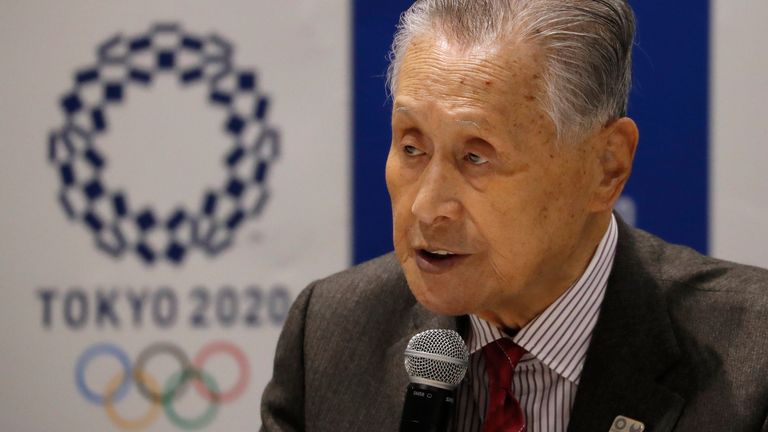Tokyo 2020 Olympics: Final schedule confirmed
IOC president Thomas Bach also confirms rules around staging protests during competition and ceremonies will be discussed with athletes
Friday 17 July 2020 16:43, UK
Next year's Tokyo Olympics will follow an almost identical competition schedule as the one planned for this year before the event was postponed due to the coronavirus pandemic, organisers have confirmed.
The International Olympic Committee (IOC) and Japanese government decided in March to postpone the Games until 2021 and organisers have been working to rearrange an event almost a decade in the making.
The opening ceremony for the Olympics will be on July 23, 2021. However, women's softball and football will open on July 21, men's football on July 22, and archery and rowing on July 23.
On July 24, the first full day after the opening, the first medal event will be the women's 10-metre air rifle.
The Games are set to be the biggest ever in terms of events, with a record 339 medals available, before the closing ceremony on August 8.
One of the biggest hurdles for organisers was securing the 42 venues needed for the Games as many had already been booked for 2021.
However, Tokyo 2020 executive director of operations Satoshi Yamashita said this week all venues had been secured verbally.
The marathon and race-walking events will remain in the northern city of Sapporo after being controversially moved out of Tokyo because of the anticipated scorching summer heat.
Cancelling Tokyo 2020 would cost more
Cancelling the Olympic Games in Tokyo amid the coronavirus pandemic could cost two or three times more than staging the event, the president of the organising committee has warned.
Enthusiasm for the Games in Japan appears to be waning, with almost 30 per cent of respondents to a recent telephone poll of Tokyo residents calling for the event to be cancelled.
However, Tokyo 2020 president Yoshiro Mori took a dim view of that suggestion and said: "If we cancel the Games the cost will be two times the current cost that is required.
"We do not decide on the fate of the Olympic Games considering only the convenience of Japan alone."
Asked to expand on why costs would increase in the event of cancellation, he said: "If you follow the conventional thinking and common knowledge, if the Games are cancelled it's going to create a lot of waste.
"You have already invested in certain things and if the Games are not going to happen it certainly will result in a big [amount of] waste.
"For example, if the Games are cancelled who is going to make the compensation for various reasons? Who is going to pay the money to compensate for the losses? If you follow the common knowledge you would easily come to two times or even three times more [in additional cost]."
Bach: Protests to be discussed with athletes
IOC president Thomas Bach also said rules around staging protests during competition and ceremonies will be discussed with athletes.
Rule 50 of the Olympic Charter states that the field of play and medal events should be "separate from political, religious or any other type of interference" but it has been criticised recently, with the Athletics Association saying it is not fit for purpose.
There is a concern athletes will be penalised if they show support for the Black Lives Matter movement during next summer's rescheduled Games in Tokyo.
However, Bach told the IOC session his organisation's Athletes Commission will consult on the rule.
The 66-year-old German went on to confirm he was ready to run for a second term at next year's election.
Bach was first elected in 2013 for an eight-year term and is eligible for one further term of four years after that.





